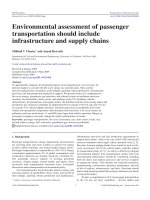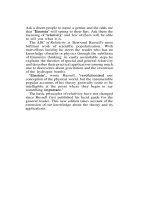seminar of migration docx
Bạn đang xem bản rút gọn của tài liệu. Xem và tải ngay bản đầy đủ của tài liệu tại đây (363.6 KB, 44 trang )
MIGRATION
MIGRATIONMIGRATION
1.History and reasons of migration
2.The effects of migration
3.Migartion in Vietnam
HISTORY OF MIGRATION
What does migration mean?
Human migration (derived from
Latin: migratio) is physical movement
by humans from one area to another,
sometimes over long distances or in
large groups.
HISTORY OF MIGRATION
Who is the migrant?
According to The United Nations,
migrant is an individual who has resided
in a foreign country for more than one
year irrespective of the causes, voluntary
or involuntary, and the means, regular or
irregular, used to migrate.
HISTORY OF MIGRATION
Historical migration of human
populations begins with the
movement of Homo erectus out
of Africa across Eurasia about a
million years ago.
HISTORY OF MIGRATION
Homo sapiens appear to have
occupied all of Africa about 150,000
years ago, moved out of Africa 70,000
years ago, and had spread across
Australia, Asia and Europe by 40,000
years BC.
HISTORY OF MIGRATION
Migration to the Americas took
place 20,000 to 15,000 years ago,
and by 2,000 years ago, most of the
Pacific Islands were colonized.
HISTORY OF MIGRATION
The evidence indicates that the
ancestors of the Austronesian
peoples spread from the South
Chinese mainland to Taiwan at
some time around 8,000 years ago.
HISTORY OF MIGRATION
Between the 11th and 18th centuries,
there were plenty of migrations in Asia.
In the Ming occupation (14th century),
the Vietnamese expanded southward in a
process known as nam tiến (southward
expansion).
HISTORY OF MIGRATION
In the 16th century, perhaps 240,000
Europeans entered American ports.
In the 19th century, over 50 million
people left Europe for the Americas.
HISTORY OF MIGRATION
The 20th century experienced also an
increase in migratory flows caused by
war and politics. Muslims moved from
the Balkan to Turkey, while Christians
moved the other way, during the
collapse of the Ottoman Empire.
HISTORY OF MIGRATION
Balkan Turks in 1912
HISTORY OF MIGRATION
About 400,000 Jews moved to Palestine in
the early 20th century. The
Russian Civil War caused some 3 million
Russians, Poles and Germans to migrate
out of the Soviet Union. World War II and
decolonization also caused migrations.
HISTORY OF MIGRATION
Swiss woman and her children leaving Civil war in Russia, around 1921
REASONS FOR MIGRATION
There are a lot of reasons for
migration, but these are some main
ones: job opportunities, higher
standard of living, education and
medical treatment, natural disasters,
wars, crimes, crisis, etc.
ADVANTAGES OF MIGRATION
Job Opportunities
If a person cannot find a job in his local area,
the best option may be to look for a job in
another place. A migrant may have a job, but
he may want to move to an area with better
living conditions and more educational
opportunities for career advancement.
ADVANTAGES OF MIGRATION
Increase in standard of living
Immigration brings about change and development.
The quality of life is significantly improved with
immigration whenever they get a goad job with
suitable salary that is always higher than his income
in their native country. It brings immigrants better
opportunities, better chances to fulfill their goals,
and a better life overall.
ADVANTAGES OF MIGRATION
Economic gains
Critics have claimed that immigrants take on
jobs, lower down wages. It is a fact that
immigrants are a source of low cost labor.
The goods produced through the efforts of
immigrant workers can also generate
additional profits as the goods can be sold at
lower price.
ADVANTAGES OF MIGRATION
A younger workforce
The ratio of retired people are dramatically
increasing in the coming decades. This is the
burden of developed countries. Immigrants,
with their children and younger relatives,
will bring a young workforce, especially
with skilled workers, that can solve this
problem well
ADVANTAGES OF MIGRATION
Cultural Freedoms
One of the major pulls for migrations of people is
the prospect of freedom in various areas of life.
For example, religious freedom may be important
to a migrant who cannot openly practice his
religion in his home country. A scholar may flee to
another country in ordee to continue his works.
ADVANTAGES OF MIGRATION
Increase in cultural diversity
The world seems to be growing smaller by
the day, with different cultures within reach
today than ever before. Immigration
increases product diversity, something that
many people enjoy very much. It means that
there are a lot of cultural exchanges among
other countries.
DISADVANTAGES OF MIGRATION
Culture Shock
Culture shock is the big trouble that
immigrants have to face. They have no plan
to go back home, so they are forced into
accepting a new culture and learning how to
behave reasonablely in new ways. The
biggest problem is language, and other
differences include diet, clothing and music.
DISADVANTAGES OF MIGRATION
Environmental Differences
Migration brings people to new
geographies and new climates. A change
of scenery can be very interesting for
new migrants, but many have trouble
with their bodies to major changes in
climate.









